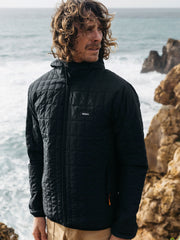The Outdoor Swimming Society, version 1.0, was all communicating one simple message - “come on in, the water is lovely” - via every platform we could find. For over a decade we’ve set about telling as many people as we can that swimming outdoors is magical and transformative. That going for a swim has a way of washing your worries away so you emerge calm and energised, with the world in technicolour.
In 2019 that message has changed: at this point in history we need to become a little less evangelical, a little more realistic - it is more about acknowledging the power of embracing the discomfort, than minimising the discomforts of swimming in the first place. For The Outdoor Swimming Society 2.0, we want to get across that whilst swimming might make you feel really special, you don’t need to be a special person to do it!
Maybe in the first wave of the movement we naturally focused on people who are already quite strong swimmers, who were already very outdoors-y – whether they’re climbing or hiking or mountain biking or surfing – they already have all that going on in their lives. Whereas, where I think we want to take it next is to show it more to everybody. Whatever your age, wherever you live, whatever you choose to do in the rest of your life, however sporty or non-sporty you might be, whether you’ve grown up with that adventurous outdoors background or not, we want outdoor swimming to feel like something that you can do and to arm you with enough facts that you can go off and do it safely.
















































































